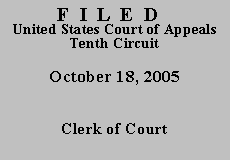 UNITED STATES COURT OF APPEALS
UNITED STATES COURT OF APPEALS
 UNITED STATES COURT OF APPEALS
UNITED STATES COURT OF APPEALS
UNITED STATES OF AMERICA,
Plaintiff - Appellee,
v.
WESLEY DEAN STANDRIDGE,
Defendant - Appellant.
Before BRISCOE, McKAY, and HARTZ, Circuit Judges.
Defendant pled guilty to being a felon in possession of a firearm in violation of 18 U.S.C. § 922(g), and to possessing an unregistered firearm in violation of 26 U.S.C. § 5861(d). The district court then sentenced Defendant to thirty-eight months' imprisonment.
Initially, Defendant appealed his conviction to this court on Fourth Amendment grounds. We previously affirmed the district court's judgment and sentence on that issue. United States v. Standridge, No. 04-5066, 2004 WL 2944161, at *3 (10th Cir. Dec. 21, 2004). Subsequently, Defendant petitioned the United States Supreme Court for a writ of certiorari. After granting Defendant's cert petition, the Supreme Court vacated the judgment and remanded the case to this court for further consideration in light of its holding in United States v. Booker, __U.S.__, 125 S. Ct. 738 (2005) (holding that the mandatory application of the United States Sentencing Guidelines violates a Defendant's Sixth Amendment rights). Standridge v. United States, __U.S.__, 125 S. Ct. 1962 (2005).
Consistent with the directive given to us by the Supreme Court, we ordered supplemental briefing from the parties regarding sentencing. In his supplemental brief, Defendant challenges his sentence as being imposed in violation of his constitutional rights, as articulated in Booker. Because Defendant did not raise this issue to the district court, we review for plain error. United States v. Gonzalez-Huerta, 403 F.3d 727, 732 (10th Cir. 2005) (en banc) (citations omitted). Under that standard, we will only reverse Defendant's sentence if Defendant can prove that the sentence imposed was (1) error, (2) which is plain, (3) which affects his substantial rights, "and which (4) seriously affects the fairness, integrity or public reputation of the judicial proceedings." Id. (quotation omitted).
We have recognized two types of Booker errorsconstitutional and non-constitutional. Id. at 731-32. In this appeal, Defendant claims that the district court committed non-constitutional error when it applied the United States Sentencing Guidelines ("Guidelines") in a mandatory fashion at sentencing.
We agree with the parties that the district court's mandatory application of the Guidelines was plain error, thereby satisfying the first two prongs of plain-error review. See id. We must therefore consider whether Defendant has satisfied the third and/or fourth prongs of plain-error review.
In this case, the district court, after reviewing the presentence report and applying the Guidelines enhancement, determined that Defendant's Guidelines imprisonment range was from thirty-seven to forty-six months. After making this determination, the sentencing court decided to impose a sentence of thirty-eight months, "between the low end and the middle" of the Guidelines range. Supp. Rec., Vol. 1, Sent. Tr. at 5. Based on this sentence, there is no reason to believe that the district court would have imposed a less severe sentence with its new post-Booker discretion. See United States v. Riccardi, 405 F.3d 852, 876 (10th Cir. 2005) (denying defendant relief even when applying the less rigorous harmless error test). The fact that the district court judge did not impose a sentence at the bottom of the Guidelines range indicates that there is no reasonable probability that the court would reduce Defendant's sentence on remand post-Booker. See id. ("Having exercised his limited discretion under the pre-Booker system to give [Defendant] the highest permissible sentence, there is no reason to think the judge would exercise his now-greater discretion to reduce the sentence.") (citation omitted). Also, there are no remarks in the record which demonstrate that the thirty-eight-month sentence was inappropriate in light of all the circumstances. See id. Thus, Defendant fails to satisfy the third prong of the plain error test. Having determined as much, we need not address whether Defendant meets the fourth prong of the plain error test. See United States v. Dowlin, 408 F.3d 647, 671 (10th Cir. 2005) (explaining that a party's failure to meet one prong of the test is a sufficient reason not to notice plain error).
Accordingly, even though Defendant's sentence was imposed in violation of the Sixth Amendment standards set forth in Booker, the error did not violate Defendant's substantial rights and must be disregarded. We AFFIRM Defendant's sentence and REINSTATE all non-sentencing portions of our previous opinion.
Entered for the Court
Monroe G. McKay
Circuit Judge
*. This order and judgment is not binding precedent, except under the doctrines of law of the case, res judicata, and collateral estoppel. The court generally disfavors the citation of orders and judgments; nevertheless, an order and judgment may be cited under the terms and conditions of 10th Cir. R. 36.3.